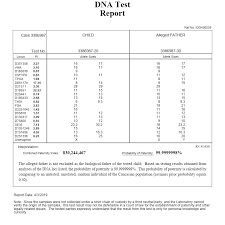
The Importance of Paternity Testing
Paternity testing is a crucial tool in determining the biological relationship between a father and a child. It involves comparing the DNA of the child with that of the potential father to establish whether or not they share genetic markers.
There are several reasons why paternity testing is important:
- Legal Matters: Paternity testing is often required in legal cases such as child custody, child support, and inheritance disputes. Establishing paternity through DNA testing can have significant implications on these legal matters.
- Emotional Closure: For both the father and the child, knowing the biological relationship can provide emotional closure and a sense of identity. It can help strengthen family bonds and foster a sense of belonging.
- Medical Reasons: Knowing one’s genetic heritage through paternity testing can be essential for medical reasons. It can help identify potential hereditary health risks and guide medical treatment decisions.
- Social Security Benefits: Paternity testing is often necessary to claim social security benefits or other government assistance programs that require proof of parentage.
In recent years, paternity testing has become more accessible and accurate, making it easier for families to resolve paternity issues quickly and efficiently. Whether it’s for legal reasons, personal peace of mind, or medical considerations, paternity testing plays a crucial role in ensuring the well-being of children and families.
7 Essential Tips for Navigating the Paternity Testing Process
- Ensure the paternity test is conducted by a reputable and accredited laboratory.
- Follow the instructions carefully for collecting DNA samples to avoid contamination.
- Understand the legal implications of the paternity test results in your jurisdiction.
- Discuss the potential emotional impact with all parties involved before proceeding.
- Consider seeking counseling or support to help cope with any difficult outcomes.
- Respect everyone’s privacy and confidentiality throughout the testing process.
- Be prepared for possible variations in cost, accuracy, and turnaround time among different testing providers.
Ensure the paternity test is conducted by a reputable and accredited laboratory.
It is crucial to ensure that the paternity test is conducted by a reputable and accredited laboratory. Choosing a reliable facility guarantees the accuracy and validity of the results, providing you with confidence in the outcome. Accredited laboratories adhere to strict quality standards and protocols, ensuring that the testing process is conducted with precision and integrity. By selecting a reputable laboratory for your paternity test, you can trust in the reliability of the results and make informed decisions based on accurate genetic information.
Follow the instructions carefully for collecting DNA samples to avoid contamination.
It is crucial to follow the instructions carefully when collecting DNA samples for a paternity test to prevent contamination. Contamination of DNA samples can lead to inaccurate results, potentially causing confusion and delays in resolving paternity issues. By adhering to the provided guidelines for sample collection, individuals can ensure the integrity of the testing process and increase the likelihood of obtaining reliable and conclusive results.
Understand the legal implications of the paternity test results in your jurisdiction.
It is essential to understand the legal implications of the paternity test results in your jurisdiction. The results of a paternity test can have significant consequences in various legal matters such as child custody, child support, inheritance rights, and more. Different jurisdictions may have specific laws and regulations regarding paternity testing and its outcomes, so being informed about how the results may impact your legal rights and responsibilities is crucial for making well-informed decisions for you and your family.
Discuss the potential emotional impact with all parties involved before proceeding.
Before proceeding with a paternity test, it is crucial to discuss the potential emotional impact with all parties involved. Understanding and addressing the feelings, concerns, and expectations of both the potential father and the child can help prepare them for the results, whether they confirm or challenge their assumptions. Open communication and empathy are key in navigating the emotional complexities that may arise from a paternity test, ensuring that all parties feel supported and respected throughout the process.
Consider seeking counseling or support to help cope with any difficult outcomes.
When undergoing a paternity test, it is important to consider seeking counseling or support to help cope with any difficult outcomes that may arise. The results of a paternity test can have significant emotional implications for both the father and the child involved. Counseling can provide a safe space to process feelings, navigate complex family dynamics, and seek guidance on how to move forward in a healthy and constructive manner. Seeking support during this challenging time can help individuals cope with any unexpected results and facilitate open communication within the family unit.
Respect everyone’s privacy and confidentiality throughout the testing process.
Respecting everyone’s privacy and confidentiality throughout the paternity testing process is essential to maintaining trust and dignity. It is crucial to handle sensitive information with the utmost care and discretion, ensuring that all parties involved feel secure and respected. By upholding strict confidentiality standards, we can create a safe and supportive environment for individuals seeking clarity on paternity issues, fostering a sense of comfort and confidence in the testing process.
Be prepared for possible variations in cost, accuracy, and turnaround time among different testing providers.
When considering a paternity test, it is essential to be prepared for possible variations in cost, accuracy, and turnaround time among different testing providers. Different laboratories and companies may offer varying prices for their services, have different levels of accuracy in their testing methods, and provide results at different speeds. It is important to research and compare multiple providers to ensure that you choose the one that best fits your needs and budget while also prioritizing accuracy and efficiency in delivering results.
